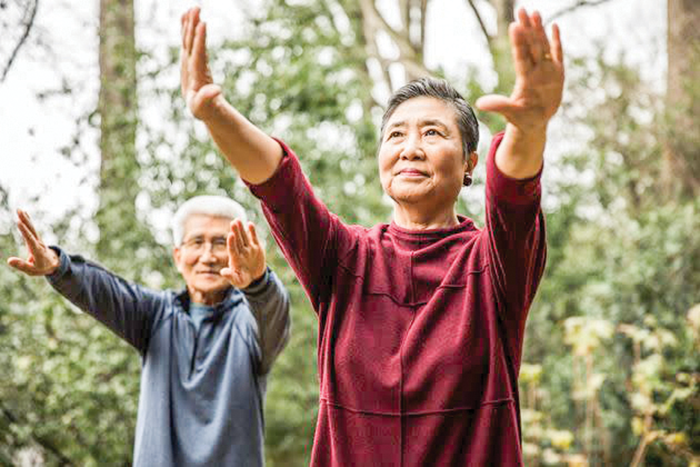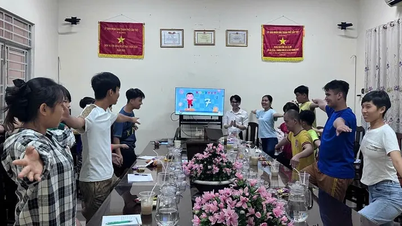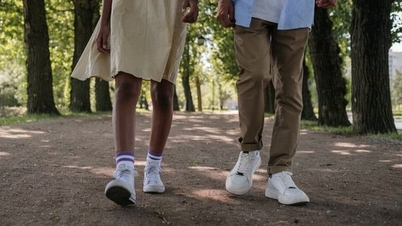Good physical, emotional and mental health contributes to healthy aging. Photo: Getty Images
“In my opinion, healthy aging includes three main elements: physical health, emotional connection and spiritual support,” said Dr. Parul Goyal, a geriatrician at Vanderbilt University Medical Center in Nashville.
Factors that help older adults live a fulfilling, active, and healthy life include:
Take time to learn new things
Older adults have fewer opportunities to absorb new information because they have dropped out of school or are no longer working; learning opportunities are also limited if they are not proactive. According to Dr. Goyal, to have good cognitive health, older adults need to be mentally strong, maintain mental activity, and exercise to stimulate the brain...
So she encourages older adults to learn something new, whether it’s a new game, exercise, language, or musical instrument. “It helps build new pathways in the brain so they can continue to stay cognitively strong,” Goyal says.
Be honest about your needs
“Often, people don't do well in old age because they don't talk about their needs,” says Robyn Golden, vice president for social work and community health at Rush University Medical Center in Chicago.
So anyone who can share their thoughts and needs with family and friends, who feels comfortable saying “this is what I need, I feel lonely, I need someone to hang out with…” is a very good sign.
There’s also a common misconception that anxiety or depression after a certain age is “normal,” but Golden says that’s a mistake. If you’re struggling with depression or anxiety, it’s important to talk to your doctor about treatment options, whether it’s medication, counseling, group interventions, etc.
There is a community around
Loneliness and isolation are such a big problem that the US Surgeon General has declared it widespread across the country.
To combat feelings of loneliness and isolation, it’s important to strengthen social connections, whether with friends, family, or community groups. Golden says older adults can volunteer locally or help a neighborhood child learn to read.
Social interaction can also help brain health, according to Dr. Lee Lindquist, chief of geriatrics at Northwestern Medicine in Chicago. “We think of the brain as a muscle, so if you sit in a room all day and don’t talk to anyone, you’re essentially living in a nursing home… The brain becomes sluggish because it’s not being stimulated,” Lindquist said.
Socializing, whether it's talking in person or over the phone, interacting with people on Zoom, or joining a book club, is a way to exercise and keep your brain healthy.
Prioritize physical health
Eating a nutritious diet and exercising are important, especially as you age.
Goyal said she often recommends a healthy diet rich in fruits and vegetables, and incorporating the Mediterranean and DASH diets. These diets prioritize whole grains, healthy fats, lean meats, and plant-based foods. Drinking enough water is also part of a healthy diet.
It is also important to maintain physical fitness, especially strength training, as muscle mass decreases as we age. Weight lifting, Pilates, yoga and tai chi all help to build muscle. Walking, cycling, swimming and running are also important for cardiovascular health.
Dr. Lindquist notes that many people may be reluctant to move around as they age for fear of falling, but exercise — whether it's walking or taking a tai chi class — can help reduce the risk of falling.
Do what you love
“I like people who are engaged in activities and enjoy life, and then do it in a way that brings them joy like traveling , learning new recipes or playing games with their family,” says Lindquist.
If you do things you enjoy, older adults are less likely to get bored, because boredom is not good for old age. “Feeling like the days are long is not a good sign,” Goyal warns. Hobbies, volunteering, and spending time with loved ones are all good ways to combat boredom.
Talk to your doctor about the medications you are taking.
Being prescribed a medication by your doctor at age 50 doesn't mean it will still be effective 20, 30, or 40 years later.
“A lot of the time, we take more medication than we really need. Our bodies change, and we may not need certain medications,” Lindquist explains. For example, the antidepressants we took when we started working in our 50s may no longer be necessary after we retire.
It is important to talk to your doctor about any medications you are taking. This way, they can consider which medications are unnecessary or could be harmful when taken in old age.
Planning for the future
“The other thing I always tell people is to plan ahead, because even though everyone wants to live to be a hundred, healthy and happy, there is a chance that something will happen that requires hospitalization, or requires additional support at home,” Lindquist says.
It is important to talk to family and friends about what we would want in the event of a hospitalisation, a fall or even dementia. This way, our loved ones will be prepared if anything bad happens. Older people can also talk to their children or partners about the kind of support they would want when they reach a stage where they are no longer able to care for themselves.
Experts say if you haven’t done any of these seven things yet, don’t panic. Start them as soon as possible. “I really want people to start thinking about aging well in their 30s and 40s. If you build healthy habits early, you can maintain them into your golden years,” Goyal says.
If you prioritize your relationships, physical health, mental health, and future plans, you will always feel good no matter what age you are.
LE THU (According to HuffPost, Healthy Aging)
Source: https://baocantho.com.vn/7-yeu-to-giup-lao-hoa-lanh-manh-a190342.html



![[Photo] General Secretary To Lam receives US Ambassador to Vietnam Marc Knapper](https://vphoto.vietnam.vn/thumb/1200x675/vietnam/resource/IMAGE/2025/9/29/c8fd0761aa184da7814aee57d87c49b3)
![[Photo] Many streets in Hanoi were flooded due to the effects of storm Bualoi](https://vphoto.vietnam.vn/thumb/1200x675/vietnam/resource/IMAGE/2025/9/29/18b658aa0fa2495c927ade4bbe0096df)
![[Photo] National Assembly Chairman Tran Thanh Man chairs the 8th Conference of full-time National Assembly deputies](https://vphoto.vietnam.vn/thumb/1200x675/vietnam/resource/IMAGE/2025/9/29/2c21459bc38d44ffaacd679ab9a0477c)

![[Photo] General Secretary To Lam attends the ceremony to celebrate the 80th anniversary of the post and telecommunications sector and the 66th anniversary of the science and technology sector.](https://vphoto.vietnam.vn/thumb/1200x675/vietnam/resource/IMAGE/2025/9/29/8e86b39b8fe44121a2b14a031f4cef46)
![[Photo] General Secretary To Lam chairs the meeting of the Central Steering Committee on preventing and combating corruption, waste and negativity](https://vphoto.vietnam.vn/thumb/1200x675/vietnam/resource/IMAGE/2025/9/29/fb2a8712315d4213a16322588c57b975)


































































































Comment (0)